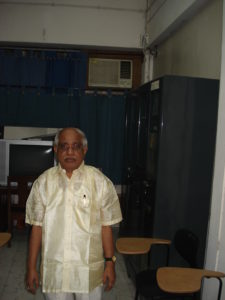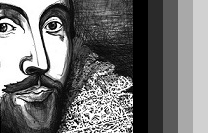Monday,11,2019
 Formerly Professor of the Department of English, University of Burdwan.
Formerly Professor of the Department of English, University of Burdwan.
Interviewed by Sri Abhishek Sarkar.
Year of passing B.A. and M.A. Details of the institutions concerned.
B.A. in 1965 from Burdwan University. M.A. in 1969, first class first, also from the same university.
When did your first encounter with Shakespeare take place (at school or college)?
At school, there was a rapid reader of Shakespeare. At S.B. Vidyatan, Burdwan in Classes 9 and 10 we had The Merchant of Venice (abridged edition). At home I read Lamb’s Tales from Shakespeare from my father’s library. I passed Higher Secondary in 1962. Between school and college I read the Verity edition of Macbeth and then the following year its Arden edition. And much later the Cambridge edition.
College and university syllabi (Shakespeare plays and poems).
Honours syllabi included Macbeth, Hamlet and As You Like It. M.A. syllabi included plays such as Henry IV Part I, King Lear, Othello, Tempest and Shakespeare criticism. It was a 100 marks paper.
Who taught the texts in question?What techniques were used (e.g., close reading, lecture demonstration, group discussion, seminars etc) for teaching Shakespeare?
Mainly through close reading of the text, study of characterization and psychology. The theatrical aspect was ignored. The performance aspect of the plays was never stressed in class. Textual studies were maintained throughout. The professors gave special emphasis to the characterization. The dramatic aspects were however deleted. Apart from P.C. Ghosh who actually carried live branches of trees into the classroom to dramatize the movement of Birnam Wood to Dunsinane. The sonnets of Shakespeare were also given high importance in these courses for their tonal quality. Professor Percival took a unique and original approach to teaching and T.N. Sen was scholarly in his lectures. Professor Debabrata Mukherjee and Jyoti Bhattacharjee were professors in JU who taught with histrionics. Philosophical aesthetics were also maintained while dramatizing these plays. Shakespeare’s plays are better adapted for the stage, it cannot merely be bound to the parameter of the text, it begs to be staged.
What traits of teachers do you remember?
S.C. Sengupta, the HOD, was a unique phenomenon. He is currently writing a short book on Professor Sadananda Bhattacharjee who taught Shakespeare among many others. Sadananda Bhattacharjee brought in Greek tragedy by way of contrast. He also referred to and carried on the tradition of Professors Percival, P.C. Ghosh and T.N. Sen. Sarbandu Chakraborty taught King Lear but he could not go beyond the storm scene because of the intensity of the teaching and Kali Das Bose was also a good professor. Tirthankar Bose also taught me, he taught us Volpone. He wrote many scholarly books and articles but somehow I felt he did not take his classes seriously. Dr. Shanti Ranjan Banerjee taught Othello, he paraphrased and told us the essential points but wasn’t very remarkable as such. Tempest was taught by Professor Homendra Nath Bhattacharjee. Henry IV was taught by Professor Bishwanath Bhattacharjee. Sadananda-babu was very particular in his love for philosophy and aesthetics and frequently incorporated these into his lectures.
Did the teacher enact the scenes in the class room?
Not at all. Amitabha-babu used to enact as far as I’ve heard. Jyoti-babu generated a histrionic power but never enacted in the classroom.
Was the teacher very particular about pronunciation and accent?
No. This awareness was not injected into us. On the contrary, other than Sadananda-babu, the other professors mispronounced things to an appalling extent. Our teachers didn’t even emphasize the need for correct pronunciation and accent.
Did the teacher discuss philology and prosody while reading Shakespeare?
We had a separate course on Rhetoric and Prosody but it wasn’t taught in conjunction with the Shakespeare texts.
Were expletives and sexual references omitted?
These references were swept under the carpet. In King Lear and Macbeth, sexual references were simply bypassed. Presidency was a little less inhibited, whereas in Burdwan the taboos are very strong. In my teaching career I have noticed this widely.
Were Shakespeare’s contemporary dramatists given the same amount of importance in the classroom?
Not at all. Very rarely Marlowe was referred to. Shakespeare’s contemporaries came into prominence thanks to T.S. Eliot. A host of dramatists were brought into the limelight because of Eliot’s critical writings on them. Dr. Faustus, Volpone and Duchess of Malfi were in the syllabus. Every Man in his Humour by Jonson at the B.A. level.They were never discussed together or in contrast with each other.
Were students encouraged to think independently and challenge the teacher?
It was a one way performance. If a student wanted to ask anything they went to the professor’s room much later. Now we have analytical give and take in the classroom. The teacher delivered a lecture and the students took notes back then. The eloquence was rather unwelcome in this case. It was also partly due to reverence.
Editions and critical material prescribed and used.
Verity, Arden, Cambridge and Clarendon were used. I remember a lot of students reading the cheap guide books available in the markets with question answers and essays. Subodh-babu sponsored a series with the help of his students and published a guide book which wasn’t really bad.
Examination and question pattern.
Essay type questions carrying 16 marks and explanations carrying 8 marks each. The essay type questions were generally on characters, scenes and other important characteristics of the text.
Did the teacher refer to stage and film productions of Shakespeare?
The professors didn’t really talk about the performance aspect of any of the plays that we studied. They almost didn’t even know about any adaptations. These have only very recently come into the limelight.
Whether there was any performance of Shakespeare at the institution.
The institution never had any productions, when we wanted to we came to Kolkata to watch productions by famous groups and/or film adaptations.
Account of classmates who later distinguished themselves as teachers, performers etc.
None of my classmates are remarkable as teachers or performers. A friend Dr. Roma Kundu has become a scholar, she studied in Chandannagar. She was my classmate in M.A. She was never successful in the classroom but I know she became a scholar.
Noticeable changes in Shakespeare pedagogy and student reaction over the decades.
There has been a paradigm shift in the study of Shakespeare these days. Only a close reading is not enough these days. A lot of critical work has been done since then and all of this is considered extremely relevant in Shakespearean Studies today. Macbeth for example can be read from so many angles now- political, feminist, psychoanalytical – these form a foundation for the critical analysis of Shakespeare in today’s time.
What differences have you noticed between Shakespeare teaching your country and abroad?
Obviously, there is a huge difference. Why do you think students go abroad to do their Ph.D’s?
Do you think that Shakespeare is an overrated author?
Never. Shakespeare yields new meanings in every time I read it. I think he is greatly undervalued these days. However I know for a fact that this is a prevalent idea in today’s students. Post-colonialism has opened a floodgate of soft options that the students are dying to lay their hands on.
How would you react to the phenomenon of reading Shakespeare in a simplified language or in paraphrase, now popular among students in the West?
An artificial stilted language has been adopted for these simplified Shakespeare texts. The 19th century lost itself in Shakespeare. We find and read ourselves in Shakespeare. The translations were not acceptable.
